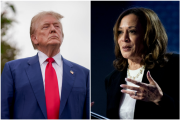
The Consumer Financial Protection Bureau once again faces an uncertain future, with the outcome of the presidential election potentially taking the agency in radically divergent directions.
If former President Donald Trump wins on Nov. 5, some experts think the agency would change direction and dramatically slow down in a second Trump administration,
If Vice President Kamala Harris wins, the CFPB would continue to be a major enforcer under CFPB Director Rohit Chopra, who likely would be more emboldened to enact regulations including added guidance that impacts banks, Big Tech companies and the financial services industry generally.
What has changed since the first Trump administration is that the president now has the power to fire the CFPB's director at any time, following
Isaac Boltansky, managing director and director of policy research at BTIG, said that if Trump wins, "Chopra will be fired on Day 1," which will shift the bureau's supervisory and enforcement postures.
Though Trump has said during his campaign that he would eliminate the Department of Education, it's unclear whether he would try to completely shutter the CFPB, or even have the ability to do so.
Ed DeMarco, president of the Housing Policy Council and a former acting director of the Federal Housing Finance Agency, said it's "too early to say," precisely what the priorities might be in a Trump administration.
"I don't see evidence that Mr. Trump is interested in dismantling the CFPB," said DeMarco, who has served in the Social Security Administration, the Treasury Department, and Government Accountability Office. "The President and his senior staff will certainly have a directional view regarding CFPB and we can expect that would be reflected in their nominee for CFPB Director."
Jeff Sovern, a law professor at the University of Maryland Francis King Carey School of Law, said the CFPB might experience the kind of rocky changes that happened in the first Trump administration when
"Given that when he was president, Trump put someone in charge of it who had called [the CFPB] a
Democrats are claiming that Trump would seek to undermine the CFPB by following the conservative blueprint known as Project 2025 published by the Heritage Foundation. Project 2025 envisions passing a rider in the Financial Services and General Government appropriations bill that would restructure the agency's leadership.
Jim Parrott, a nonresident fellow at the Urban Institute and former senior advisor at the National Economic Council in the Obama administration, said industry wants more coherence and consistency in financial policy, including calling for a housing czar.
Giving the president more direct control over how the CFPB operates, an issue that Project 2025 proposes, would make the bureau "more partisan and the rules of the road in financial services more volatile, with even more dramatic swings from one administration to the next," he said.
"I can't imagine that industry would want that, much less consumers," Parrott said.
Richard Horn, co-managing partner at the law firm Garris Horn and a former CFPB senior counsel and special advisor, said dismantling the CFPB has not necessarily been part of Trump's agenda. Rather, House Republicans have sought unsuccessfully for years to have the CFPB governed by a board rather than a single director.
"The fact that Republicans are trying to rein in the CFPB isn't new, there have been bills almost every year since the CFPB was in existence to put the CFPB under a committee or even to eliminate the CFPB," Horn said.
He also noted that in his first administration, Trump appointed former CFPB Director Kathy Kraninger, who was quite aggressive in the enforcement arena. Kraninger continued many redlining investigations and exams, and even filed the
Under a second Trump administration, Boltansky thinks the CFPB's
Possible candidates being floated as CFPB director in a Trump administration include Keith Noreika, the former Acting Comptroller of the Currency, who is currently executive vice president and chairman of banking supervision and regulation at Patomak Global Partners; and Todd Zywicki, a law professor at George Mason University's Antonin Scalia School of Law who
If Harris wins, Chopra would continue his
But he also might be tapped for another job in a Harris administration. Chopra's five-year term ends in September 2026.
Chopra has plenty of items still on his plate including additional add-on rulemakings for
Potential candidates to replace him include






